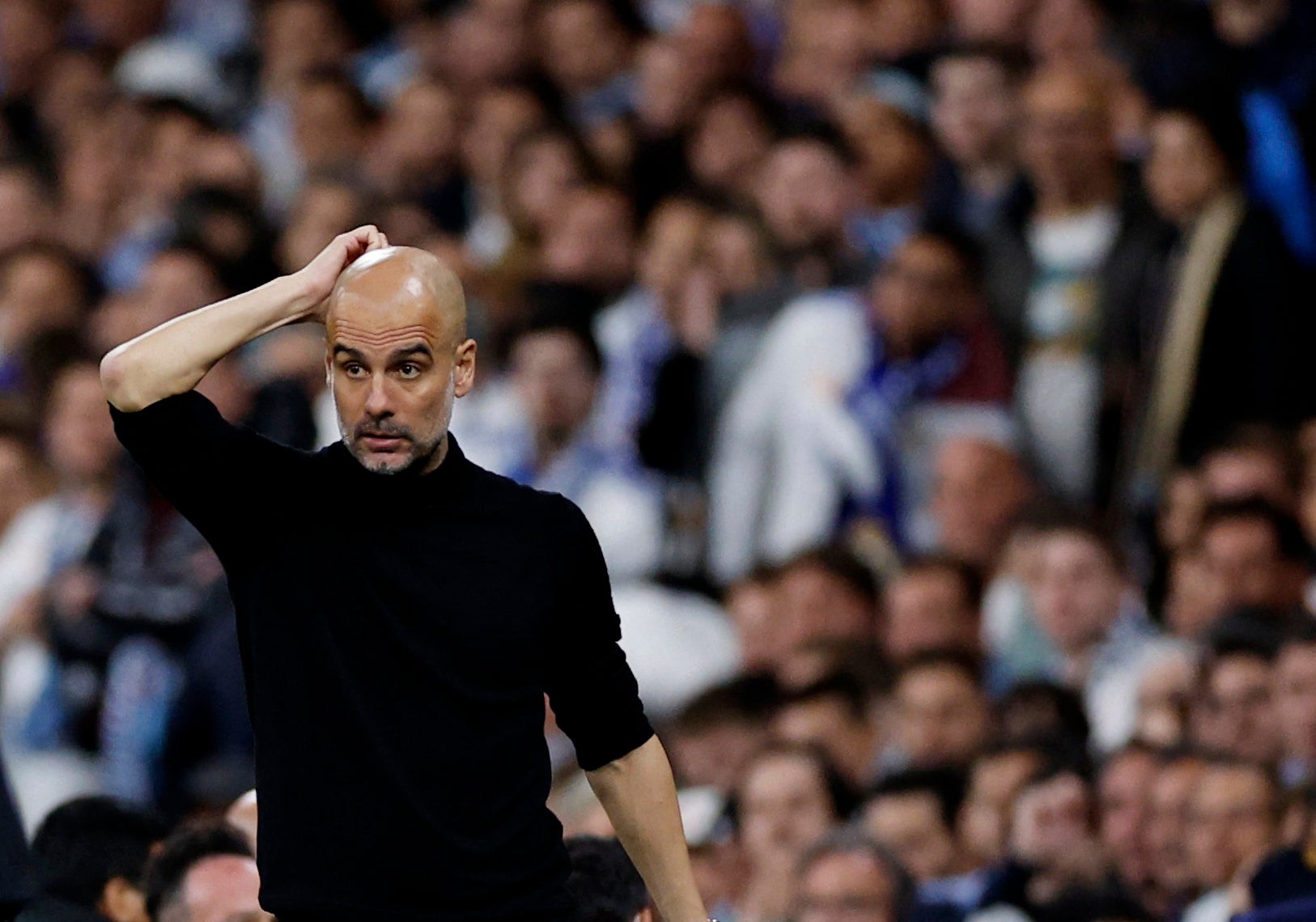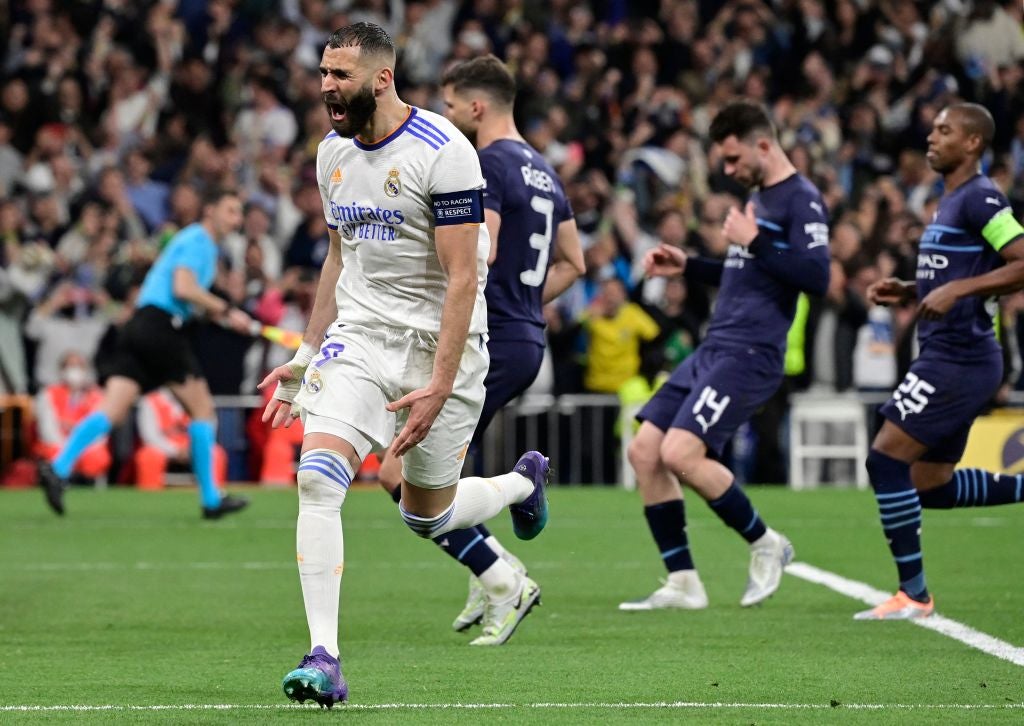Pep Guardiola’s familiar Champions League collapse goes beyond luck
City had a two-goal advantage heading into the 90th minute, only to collapse in a devastating fashion that has become all too familiar for the Spanish coach

Your support helps us to tell the story
From reproductive rights to climate change to Big Tech, The Independent is on the ground when the story is developing. Whether it's investigating the financials of Elon Musk's pro-Trump PAC or producing our latest documentary, 'The A Word', which shines a light on the American women fighting for reproductive rights, we know how important it is to parse out the facts from the messaging.
At such a critical moment in US history, we need reporters on the ground. Your donation allows us to keep sending journalists to speak to both sides of the story.
The Independent is trusted by Americans across the entire political spectrum. And unlike many other quality news outlets, we choose not to lock Americans out of our reporting and analysis with paywalls. We believe quality journalism should be available to everyone, paid for by those who can afford it.
Your support makes all the difference.The Manchester City players were barely speaking. If they had been “emotionally exhausted” after the first leg against Real Madrid, as many sources have it, the scene in the dressing room at the Bernabeu was one of utter devastation.
The players and staff simply couldn’t believe it.
The truth is that one influenced the other, one built on top of the other. Even before the explosions at the end of this match at the Bernabeu, and another Pep Guardiola implosion, the City players knew that they should have won the tie at home. It should have been 5-2 or even 6-2, and certainly out of sight.
That already fostered an anxiety going into this second leg, while firing further belief in Madrid. All of this then layers onto what happened in the latter stages of this game. Jack Grealish missed two chances. Real Madrid began to find openings.
One goes in, and it all opens. The Bernabeu crowd, at a level beyond anything ever heard at the Etihad and fired by seven decades of history all game, just roar them on.
These are the most damning details of all. As this match ticked into the 90th minute, City had a two-goal advantage, and were pretty much in the Paris final. A mere six minutes of play later, they had conceded three times, and were out.
The stakes probably make it the worst of Guardiola’s eliminations but so, arguably, do the sheer numbers.
Consider the following. Of Guardiola’s 11 eliminations from the Champions League, going back to the first in 2009-10, a huge eight have seen periods that have involved flurries of goals conceded or astounding collapses.
- 2009-10 Inter Milan semi-final 2 goals in 13 minutes
- 2014 Bayern Munich semi-final 3 goals in 18
- 2015 Barcelona semi-final 3 in 17
- 2017 Monaco last 16 2 in 8
- 2018 Liverpool quarter-final 3 in 19
- 2019 Tottenham Hotspur quarter-final 2 in 3
- 2020 Lyon quarter-final 2 in 8
- 2022 Real Madrid semi-final 3 in 6
There is clearly something here that goes beyond basic “luck”, as even Carlo Ancelotti mentioned, or the basic madness of the game. This doesn’t just happen. It happens for a reason, and probably a few reasons at that. There’s obviously psychology, but also identity, and probably even tactics.
There’s also the likelihood that they all layer on top of each other, one influencing another. Guardiola pointedly referenced Barcelona’s 2011-12 defeat to Chelsea when asked about the nature of the eliminations, and it’s difficult not to feel that had the most profound effect on him. It didn’t have the same sort of collapse as later ties, but it set the conditions that would bring them. Guardiola always regretted how that match went “out of control”. He felt it was such a huge wasted opportunity, and couldn’t believe how his team could be so dominant and yet still lose. Rather than just accepting that this is knock-out football and it sometimes happens, though, his fixation since then has been to try and ensure no tie can ever go out of control again.
The problem, as ever with such obsessions, is that they end up becoming self-fulfilling prophecies in the wrong way. They become like Homeric literature, where the protagonist’s concerted attempts to avoid his destiny only make it more definite. Guardiola is such a clear example of this. Most infamously, there have been the bizarre tactical decisions, that probably reached a nadir in last season’s final against Chelsea with the refusal to play a defensive midfielder. This didn’t seem like one of those on the face of, but there were interesting rumblings from within Madrid in the aftermath of the game. Ancelotti’s players could not believe that City did not press them in the way they can, and the way that caused such problems in the first leg. The Spanish champions struggle to handle it. It is one thing that has been proven to work spectacularly against them, as Barcelona illustrated in that 4-0 Clasico. Madrid struggle with the tempo of a game going up. Instead, just like Paris Saint-Germain, Guardiola actually sought to bring the tempo down and – again – “control” the game.
Even more pertinent, though, is how the effect of all this probably goes much deeper. It is not just about individual decisions. It is something systemic. Because Guardiola is so intent on that control, it means his teams don’t know how to handle situations when they lose it.
There is even more wrapped up in this than the anxiety that accumulates from so many similar eliminations, though.
There’s also the apparent contradiction of the type of players Guardiola needs. As first argued by Zlatan Ibrahimovic, Guardiola requires fairly dutiful players to so specifically carry out his orders. Those who resist are generally discarded, or forced to relearn the game. The latter is what is happening with Jack Grealish.
The issue is that those players become so dependent on the system that they don’t know how to respond when the system fails. A common criticism within the game – and even from those with knowledge of the City dressing room – is that they lack “characters”.

This may be a cliche, but it has developed into one for a reason. City don’t really have the figures who can bail them out, who can impose their will on these occasions. Kevin De Bruyne is among the few, and he was not at his best at the Bernabeu, before being taken off. That was another odd decision.
There’s then a potential problem from having unlimited wealth. It makes you so powerful, and makes so many games so easy, that you don’t know how to handle it when things go against you.
Experiencing it a few times a season isn’t enough, and especially not once a year in the Champions League. It only ratchets up the doubt when you face it.
All of this came together in those six minutes at the Bernabeu, only for the team to collapse. Many might point to the sheer randomness of a defender like Ruben Dias throwing himself into such a rash challenge, but that also happens for a reason. It is a particular kind of panic that comes from the intensity of the situation, itself only amplified by the anxiety of so many similar defeats, that have partly come from so many Guardiola decisions. And on and on... to potentially go on and on for much longer.
For Madrid, it was the opposite. The memory of so many similar situations fortified them. They’d been 2-0 down against Paris Saint-Germain with 30 minutes left, and one down against Chelsea with 10 minutes left. They simply believed, as match-winning hero Rodrygo said after the game. “That’s what happens when you wear this shirt.” They will now wear that shirt to Paris, and a 17th Champions League final, looking for their 14th victory.

That is history, and it is all the more impressive given that – despite Madrid’s obvious institutional power – it goes against the current economic realities of the sport. One of the reasons Florentino Perez so wants a Super League is because his club can no longer match the financial power of the Premier League.
It is also why it is actually a good thing for football that we don’t have an all-English final, no matter how “ultimate” a showdown it would have been.
That is not what the European Cup is supposed to be about. It is supposed to be about diversity, and meetings of different football cultures. It is supposed to be international, not national. There’s also the added issue that, the more big games that England dominates, the more commercially attractive it becomes, eroding the status of everything else.
It becomes self-perpetuating. That is now something Madrid’s own self-perpetuating character and history have stopped.
It was a night for that. It’s been a season for that. It’s just been another familiar failure for Guardiola.
Join our commenting forum
Join thought-provoking conversations, follow other Independent readers and see their replies
Comments